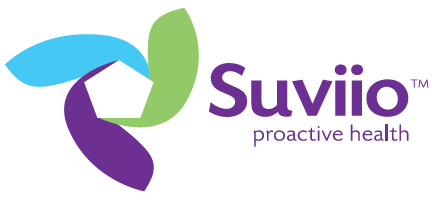No products in the cart.
-
By: Suviio Info
-
June 28, 2020
How can proactive health help our environment?
How can proactive health help our environment?
Every year on June 5th, we observe World Environment Day. This is to raise and encourage worldwide awareness and action to protect the environment. The theme this year was “Time for Nature,” with a focus on its role in providing the essential infrastructure that supports life on Earth and human development.On this special day, we want to convey a message to the world that if you take charge of your health & well being, you can help yourself and the environment.
In the last decade, national and statewide studies have revealed that many chemicals with known or suggested endocrine-disrupting potential are found in the aquatic environment. These chemicals include pharmaceuticals, personal care products, chemicals associated with waste-water effluent, and a variety of industrial compounds. Apart from the realization that waste-water chemicals and pharmaceutical drugs are detectable in much of our surface water, there is a growing concern that even at low concentrations, they may adversely affect fish, wildlife, ecosystems and possibly human health. They can also interfere with the functioning of hormones in animals and humans alike. 1Since we’re talking about health and well being, let’s talk about the effects of pharmaceuticals on our water source.
Firstly, Acetaminophen or Paracetamol, which we commonly know as Tylenol, is one of the widely consumed OTC non-prescription drug, along with Ibuprofen, which we commonly know as Advil. Both these are widely consumed by a lot people for minor aches & pain, headaches, chronic pain, inflammation, fatigue and so on. Did you know, these drugs adversely affect our liver, kidneys, and also our environment? A study of 11 lakes in Minnesota showed that pharmaceuticals, personal care products, and other chemicals were widespread at low concentration, even in lakes with minimal shoreline development. Evidence of endocrine disruption is clearly observable in fish from these lakes. 2How does acetaminophen get into the environment?
Acetaminophen enters the environment through waste-water. First, when a person takes acetaminophen, up to 9 percent of it passes out of the body (unchanged) in urine. This means it gets flushed down the toilet and mixes with waste-water. Acetaminophen also can enter waste-water when excess or expired medication is put in the sink or toilet. However, acetaminophen is always replacing itself in surface water from new waste-water. 3
What are the potential environmental impacts of acetaminophen?
Studies show that Acetaminophen may interfere with normal embryonic development, reproduction, growth, behavior, survival, and endocrine system function of fish. 3 However, this is just 1 non-prescription drug, and there are hundreds more that adversely affect our environment. We understand, that people at times do need to consume Tylenol, Advil or something similar for pain and inflammation, but if we take charge of our health proactively, our need to consume these drugs would reduce dramatically, over time.Case Study
This is a live example of my own sister who suffers from severe rheumatoid arthritis. Back in 2017 she used to take prescription arthritis medication once a week; plus in between, she would take Advil or Tylenol about 12-15 times a month. More during the colder months. I talked to her about our doctor formulated muscle support supplement MyoComfort, and said I would ship her 6 bottles to try for 6 months; but she must not wait for the pain to occur and then take it, instead take 4 capsules everyday for at least a month. She agreed and started taking 4 capsules of MyoComfort daily….within a month’s time she realized, in that month, she did take her weekly prescription arthritis medication, but consumed the additional Tylenol / Advil only 4-5 times that month. What did this mean for her?3X reduction in intake of pain management pills 3X reduction in adverse effects on liver and kidneys 3X reduction in contamination of our environment
This was a huge outcome for her, and me as a brother. Additionally, it was very encouraging for us as makers of a product that could help people stay active, and live life to the fullest. If you are a consumer of MyoComfort and MyoComfort Plus, or a doctor who prescribes it to his/her patients, or a company that distributes it, please know that we’re grateful to you for giving us an opportunity to serve you…..and also know that you’re doing your part of helping the environment, while taking charge of your health proactively. Our way of giving back, and also helping the environment, is actively spreading the message of Proactive Health. Remember, proactive health can help our environment! To Proactive Health!! Homayar “Homer” Gandhi Co-Founder, CEO 1. Study undertaken by Minnesota Pollution Control Agency “Pollutants of emerging concern” 2. Study of Pharmaceuticals and Endocrine Active Chemicals in Minnesota Lakes – 2008 3. Study of Acetaminophen In Drinking WaterCategories
Tags
all natural stress relief
Alternatives
B Vitamins fight stress
chronic pain
Clinical
doctor formulated muscle support supplement
ease muscle aches and pain
Health
healthcarespending
healthspan
helps reduce pain fatigue stress
inflammation
L-Glutathione fights stress
Magnesium flights stress
muscle aches
muscle health
muscle pain and soreness
muscle recovery
myocomfort
Nutrients
Pills
proactive health
qualityoflife
Remove term: doctor formulated dietary supplement doctor formulated dietary supplement
Remove term: doctor formulated muscle support supplement doctor formulated muscle support supplement
Remove term: fatigue and soreness fatigue and soreness
Remove term: muscle health muscle health
restfulsleep
Shortage
Tampons
Tools
trauma
Treatment
Vitamin






Leave a comment